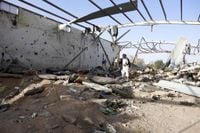In a dramatic escalation of tensions in the Middle East, Israeli airstrikes on Yemen’s Houthi-controlled capital, Sanaa, have resulted in significant destruction, including the loss of three planes and an estimated $500 million in damages to the airport. This military action comes in response to a missile attack by the Houthis that struck Ben Gurion Airport in Israel on May 4, 2025.
Israeli media reported that the airstrikes, which began on May 5, involved over 30 aircraft and targeted key infrastructure in Yemen, including the port city of Hudaydah. Eyewitness accounts and reports from Yemeni Al-Masirah channel confirmed that at least six raids were executed, with Yedioth Ahronoth stating that around 50 bombs were dropped on the port and its surroundings.
Mustafa Bakri, an Egyptian parliamentarian, has vocally condemned the Israeli and American-British military actions in Yemen. In a post on X, he stated, "The Israeli raids aimed to kill our people and destroy Yemen," emphasizing that these actions are an attack on Yemen’s civilization. Bakri expressed his belief that the Yemeni people possess the capability to resolve their own crisis, asserting, "What is taking place now against Yemen is blatant aggression and a heinous crime for which we will all pay the price."
The attacks on Sanaa have left the airport in ruins, with Khaled al-Shaief, the airport’s director, detailing the extensive damage. He noted that the terminal buildings were destroyed, and all equipment was lost, leading to a significant setback for Yemenia Airways, which had only recently resumed international flights after a six-year hiatus. Al-Shaief stated, "There are alternatives to temporarily reopen the airport, and we need a long time to rehabilitate it and restore operations." This destruction is expected to exacerbate the humanitarian crisis in Yemen, particularly affecting those in need of medical treatment abroad.
As the situation unfolds, the Houthis remain defiant. An unnamed spokesman for the group stated that their recent ceasefire agreement with the United States does not prevent them from continuing their attacks on Israel. "We will continue targeting Israeli ships until aid is delivered to Gaza," the spokesman declared, underscoring the ongoing conflict’s complexity and the Houthis' commitment to their stated objectives.
Despite the ceasefire with the U.S., which was announced on May 6, 2025, the agreement does not cover attacks on Israel. Mohammed Abdul-Salam, the chief Houthi negotiator, confirmed that the agreement does not include Israel in any form. The Houthis have launched approximately 27 ballistic missiles and several drones at Israel since March 18, 2025, following the resumption of hostilities in the Gaza Strip.
On May 7, 2025, the Israeli Air Force intercepted a drone allegedly launched from Yemen, further heightening tensions in the region. No injuries were reported from this incident, but it illustrates the ongoing threat posed by Houthi military capabilities.
The conflict has drawn international attention, with various stakeholders weighing in on the implications of the escalating violence. The U.S. decision to halt its bombing campaign against the Houthis was met with mixed reactions, with some viewing it as a necessary step towards de-escalation, while others fear it may embolden the Houthis to intensify their attacks.
In the backdrop of these developments, the humanitarian situation in Yemen remains dire. The ongoing conflict has led to widespread suffering, with millions facing food insecurity and limited access to medical care. The destruction of the airport and the loss of aircraft will only serve to complicate efforts to deliver much-needed aid to the Yemeni population.
As the situation continues to evolve, the international community watches closely, hoping for a resolution that can bring peace to a region long plagued by conflict. The statements from Bakri and the Houthi leadership highlight the complexity of the situation, where local grievances intersect with broader geopolitical tensions.
In summary, the recent Israeli airstrikes on Yemen mark a significant escalation in the ongoing conflict, with devastating impacts on the civilian population and critical infrastructure. As regional powers and international actors navigate this complex landscape, the hope for a peaceful resolution remains a distant prospect.




